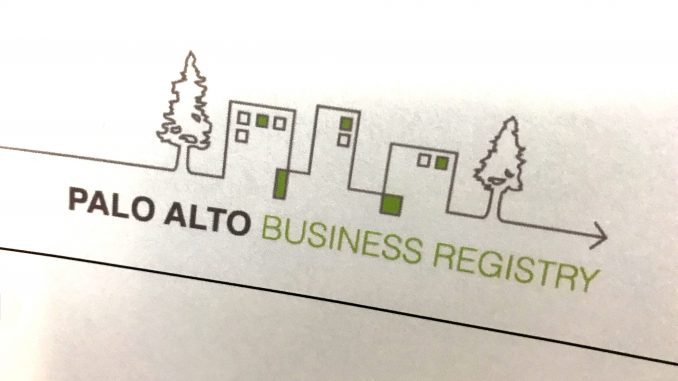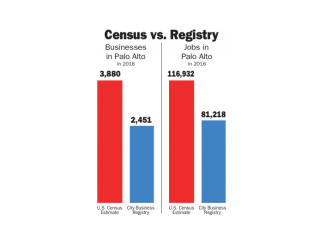
BY ALLISON LEVITSKY
Daily Post Staff Writer
The deadline for businesses to register in Palo Alto passed yesterday (April 30), but companies can still file — with a $25 fine, and a $50 fine starting next month.
Palo Alto has required businesses to register by filling out an online questionnaire and paying $51 by March 31 since November 2014, but just outsourced its revenue collections to Fresno-based MuniServices this year.
Companies were allowed to pay up until yesterday without facing a fine.
And because of a state fee for compliance with the Americans with Disabilities Act, the registry fee was raised to $54.
State Assembly Bill 1379 increased the state fee from $1 to $4 from 2018 through 2023.
Exemptions for the registry include home businesses, transitory businesses, religious organizations that don’t offer services other than a worship hall and nonprofits and businesses with less than one full-time employee.
Jacky Hood, CEO of Palo Alto-based FieldDay Solutions, said she was told after filling out a questionnaire previously that her business was exempt.
This year, she was told to register. Driver’s licenses requested Around March 1, Hood received a letter saying that the city had outsourced to MuniServices for business registration and that more information would arrive after March 12.
“The form was impossible. I could not fill it out,” Hood told the Post. “It assumes that the company has exactly two owners and it wants their driver’s licenses.”
This seemed inappropriate because FieldDay has 20 shareholders, she said.
“I don’t have the driver’s licenses for all 20 of my shareholders,” Hood said, wondering how larger companies like MongoDB and Palantir are faring.
Hood questioned why the city needs to collect the driver’s licenses of the owners of each of its businesses.
“What good does it do the city to gather the driver’s license numbers of the owners? What possible effect can that have on how the city runs?” Hood asked. “It just didn’t seem like a reasonable question.”
In both Palo Alto and Mountain View, business owners received letters notifying them that they owed the $3 or $4 for the new fee.
Greg David, owner of Eddy’s Shooting Sports in Mountain View, received a letter from the city on March 29 notifying business license owners that they owed the additional $3.
“How much are these cities spending to collect $3?” David asked. “You’ve got probably $3 worth of postage and printing to collect $3, not including all of the back employee costs of doing all this stuff. It just seems crazy that they wouldn’t just pay this out of the general fund and bill us next year.”
David said he still hasn’t paid the $3, and doesn’t plan to.
“I want them to keep sending their letters,” he quipped.




What does the community get from this fee that makes it worthwhile? I read a couple of years ago about how the information from businesses would be used to reduce traffic or improve parking. Obviously that hasn’t happened. I don’t get the point, unless it’s to annoy business owners.
Bureaucracies take on their own life, they exist to expand and to justify their existence, making lives better for citizens has nothing to do with it. When was the last time you ever heard of a “fee” (TAX) being eliminated? Don’t get me started on the tons of paper being wasted by the “environmentally conscious” Palo Alto government.
The point is not the fee, the point is the information the city collects about the businesses in Palo Alto — since they did not use to require business licenses the city government has no list of what businesses are operating in the city: who they are, what they’re doing, how many employees they have, how to contact the business owner, number of off-street parking places they have, etc. etc. The fee is a nominal $50, plus a *state mandated* $4 collected on any business license or permit or renewal of same. Collecting this information isn’t going to magically reduce traffic or improve parking, but NOT having that information makes it really difficult to do any planning about businesses transportation needs or impacts.